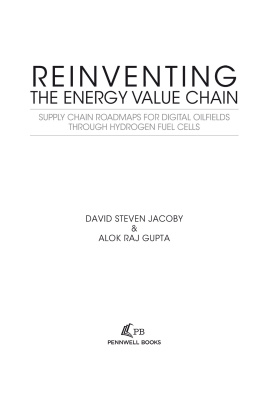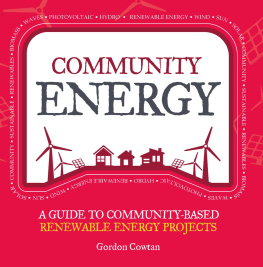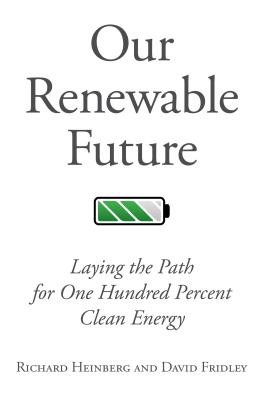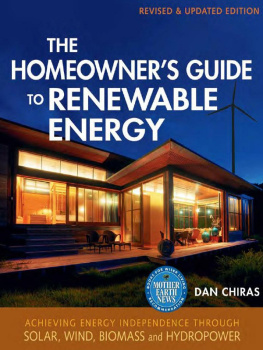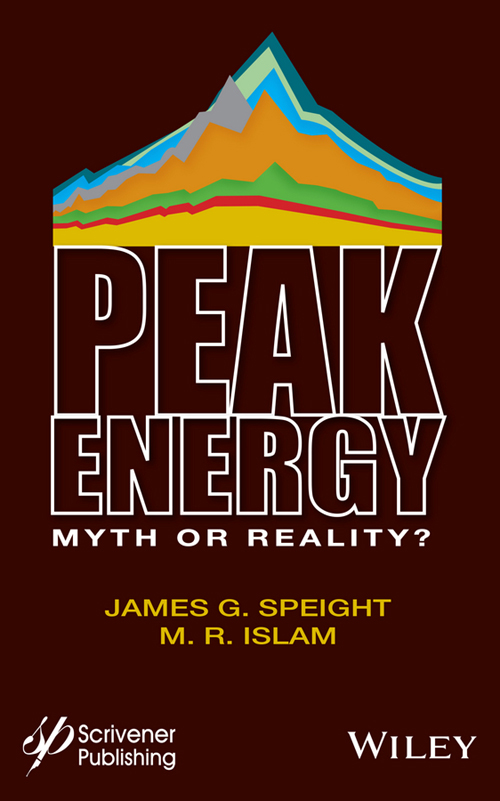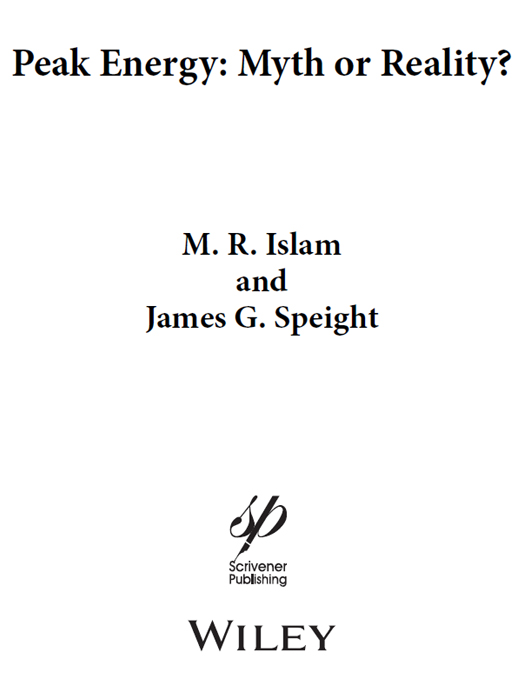Peak Energy: Myth or Reality?
Scrivener Publishing
100 Cummings Center, Suite 541J
Beverly, MA 01915-6106
Publishers at Scrivener
Martin Scrivener ()
Phillip Carmical ()
Copyright 2016 by Scrivener Publishing LLC. All rights reserved.
Co-published by John Wiley & Sons, Inc. Hoboken, New Jersey, and Scrivener Publishing LLC, Salem, Massachusetts.
Published simultaneously in Canada.
No part of this publication may be reproduced, stored in a retrieval system, or transmitted in any form or by any means, electronic, mechanical, photocopying, recording, scanning, or otherwise, except as permitted under Section 107 or 108 of the 1976 United States Copyright Act, without either the prior written permission of the Publisher, or authorization through payment of the appropriate per-copy fee to the Copyright Clearance Center, Inc., 222 Rosewood Drive, Danvers, MA 01923, (978) 750-8400, fax (978) 750-4470, or on the web at www.copyright.com . Requests to the Publisher for permission should be addressed to the Permissions Department, John Wiley & Sons, Inc., 111 River Street, Hoboken, NJ 07030, (201) 748-6011, fax (201) 748-6008, or online at http://www.wiley.com/go/permission .
Limit of Liability/Disclaimer of Warranty: While the publisher and author have used their best efforts in preparing this book, they make no representations or warranties with respect to the accuracy or completeness of the contents of this book and specifically disclaim any implied warranties of merchantability or fitness for a particular purpose. No warranty may be created or extended by sales representatives or written sales materials. The advice and strategies contained herein may not be suitable for your situation. You should consult with a professional where appropriate. Neither the publisher nor author shall be liable for any loss of profit or any other commercial damages, including but not limited to special, incidental, consequential, or other damages.
For general information on our other products and services or for technical support, please contact our Customer Care Department within the United States at (800) 762-2974, outside the United States at (317) 572-3993 or fax (317) 572-4002.
Wiley also publishes its books in a variety of electronic formats. Some content that appears in print may not be available in electronic formats. For more information about Wiley products, visit our web site at www.wiley.com .
For more information about Scrivener products please visit www.scrivenerpublishing.com .
Library of Congress Cataloging-in-Publication Data:
ISBN 978-1-118-54942-1
Preface
Crude oil, natural gas, and coal are the major sources of fuel used to supply energy for various needs. Users of crude oil, natural gas, and coal must take into account that these energy sources are, without doubt, non-renewable depleting resources, and the cost of extraction depends not only on the current rate of production but also on the amount of cumulative production. In fact, while coal is projected to last for another two hundred years or so at current rates of use, after which crude oil and natural gas will no longer be in ready supply.
This phenomenon has given rise to the peak oil theory peak oil is the point in time when the maximum rate of petroleum recovery from the reservoir is reached, after which the rate of petroleum production enters terminal decline. From this concept has emerged the wider concept of the peak energy theory which, as it is related to the availability of all fossil fuels, is also subject to decline with fossil fuel use. At this time it is worthy of note that the term peak oil is often used synonymously and interchangeably with the term peak energy crude oil being the most abundant form of energy and the terms are used interchangeably throughout this book.
The issues related to crude oil and natural gas supply and energy generation arose from the concept that both crude oil and natural gas, like any finite natural resource, have a limited lifetime that is dependent upon use (energy demand). From that, the term peak oil arose, which refers to the maximum rate of oil production, after which the rate of production enters terminal decline. Peak oil production usually occurs after approximately half of the recoverable oil in an oil reserve has been produced (i.e., extracted). The theory also espouses that the rate of world oil production cannot increase and that oil production will inevitably and irreversibly thereafter decrease with time, even if the demand for oil remains the same or increases. Following from this, the term peak energy is the point in time after which energy production declines and the production of energy from various energy sources is in decline. However, what the peak oil theory ignores is that in many oil-producing nations production declines have been offset by discoveries and production growth elsewhere in the world. Petroleum might be in the position as voiced by the immortal saying of Mark Twain the rumors of my death have been greatly exaggerated!
It is not the purpose of this book to deny that the rate of depletion of any finite natural resource increases with time assuming that the total natural resource is known and acknowledged. However, this book responds to the notions that predict the immediate death of crude oil as well as natural gas and, hence, energy production, and explores the reality of crude oil stocks and the availability of other resources to continue the necessary production of all forms of energy. In fact, the concern over crude oil supplies and other energy supplies lies mostly in the misuse of data that supposedly indicate that the world is approaching an energy precipice in which fossil fuels will no longer be available for use as energy sources the date the energy precipice is reached is wildly speculative and, in many cases, totally unrealistic.
Fossil fuel energy sources (defined as recoverable in todays term) will undoubtedly reach a depletion point in the future when these energy sources are no longer available, but not at the moment or even within the next 50 years; the reality of reserve/production ratios dispels the notion of the short lifetime of energy-producing resources. At the same time, the evolution of technologies that continue to lift the lid of recoverability will help recover supposedly unrecoverable oil from depleted reservoirs, and new gas-fired generating units use highly efficient technologies and are supported by abundant gas supplies. Added to that are the continual discoveries of new reserves and the moving of the boundary of conventional oil and gas. These issues are not always taken into account by the precipice theorists.
The issue of crude oil reserves and natural gas reserves as well as the future of the petroleum refinery and the reserves of other energy sources are discussed in the context of peak energy and the manner in which energy production scenarios can be prolonged well into the future.
Dr. James G. Speight
Laramie, Wyoming,
USA
Dr. Rafiq Islam
Halifax, Nova Scotia
Canada
About the Authors
Dr. James G. Speight
Dr. James G. Speight, who has doctorate degrees in Chemistry, Geological Sciences, and Petroleum Engineering, is the author of more than 60 books in petroleum science, petroleum engineering, and environmental sciences. He has served as Adjunct Professor in the Department of Chemical and Fuels Engineering at the University of Utah and in the Departments of Chemistry and Chemical and Petroleum Engineering at the University of Wyoming. In addition he has been a Visiting Professor in Chemical Engineering at the following universities: the University of Missouri-Columbia, the Technical University of Denmark, and the University of Trinidad and Tobago.



